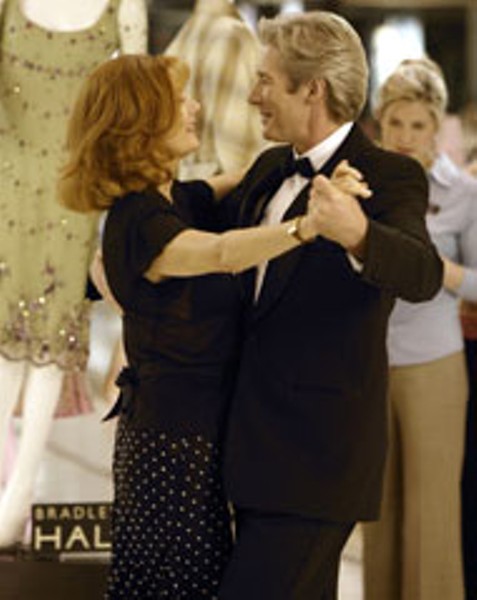Richard Gere, who had a banner year in 2002 (exceptional performances in both Chicago and Unfaithful), handles leading man duties in this new picture: He's cast as John Clark, a Chicago lawyer who, despite financial security and a happy home life, is dogged by a malaise that won't go away. One night while riding the subway home, he spots an attractive young woman standing alone in the window of a dance studio; with a mix of misery and longing playing across her face, she looks on the outside like John feels on the inside. Drawn in by her mystery (and perhaps tapping into a mid-life crisis scenario), John hesitantly pays a visit to the studio, whereupon he and two other newcomers, swaggering Chic (Bobby Cannavale) and overweight Vern (Omar Benson Miller, who looks like a young Forest Whitaker), are immediately signed up to take ballroom dance lessons from the elderly owner of the joint, Miss Mitzi (Anita Gillette).
John soon learns that his mystery woman, named Paulina (Jennifer Lopez), is one of the dance instructors, but she quickly makes it clear that she has no interest in him and that he should drop the classes if his primary reason for being there is simply to hit on her. Indeed, his interest in learning the fancy footwork does appear to dissipate once she sets these ground rules, but it's not long before he realizes that it truly is the dancing -- and not the fantasy of a younger woman -- that has revitalized his lust for life.
For her part, his wife Beverly (Susan Sarandon) knows nothing about his nocturnal activities -- he's kept his newfound interest a secret from her and the kids -- so suspecting that he's having an affair, she hires a private detective (Richard Jenkins) to follow him around. The discovery that it's only dance lessons yields mixed emotions from Beverly: While she's thankful he's not cheating on her, she nevertheless feels betrayed by the fact that he's keeping secrets from her.
Movies that teach us something new about foreign cultures are often captivating, and the Japanese version automatically earned its keep by informing us about something that, frankly, I had never even thought about: In Japan, regarded as a repressed country when it comes to open displays of affection, dancing in public is often considered a source of shame and embarrassment, and those who partake in it often must do so in complete secrecy. This cultural taboo obviously doesn't exist in the US, so the movie has to work overtime to come up with compelling reasons for John -- as well as a coworker (Stanley Tucci) who's also into dance -- to hide this fact. Unfortunately, the reasons aren't very convincing: John doesn't want his wife to know that he's anything less than ecstatic about his life, while his coworker doesn't want people to think he's gay (the movie seems curiously hung up on homophobia, with three different characters insisting they're not gay simply because they like to bust moves on the ballroom floor).
This lack of a viable center weakens the film but doesn't cripple it. No, for that, you'd have to turn to Jennifer Lopez, who's so monotonous that they could have cast a blow-up doll as Paulina and few would have noticed the difference. Her character is supposed to be racked with grief over a past mishap, yet Lopez's limitations as an actress never allow her to plummet into the depths of despair: Her pout doesn't convey tragedy as much as brattiness, as if the catastrophe in Paulina's life was that she had missed out on a clearance sale at her favorite shoe store.
As the unsettled businessman trying to stir himself out of a rut, Gere fares better than his co-star. His performance doesn't convey the bone-weary burnout of the original's Koji Yakusho (whose melancholy seemed to ooze out of every pore), but he's sympathetic in the role, and his natural grace brings the best out of his fellow actors, even Lopez on an occasion or two. For someone who's often criticized for his narcissistic airs, Gere has actually proven himself over time to be quite a generous performer, and here he's happy to let the supporting players share in the spotlight.
Yet what really elevates Shall We Dance is the exemplary work by Susan Sarandon. More so than anyone else on screen, she provides the same level of emotional investment that made the Japanese original such a masterful picture. Whether delivering a lovely (if not entirely logical) speech on why people get married or watching with a mixture of pride and pleasure as her husband unleashes his inner romantic, Sarandon is never less than compelling -- you simply can't take your eyes off her. It's lucky for Lopez that the two actresses share only one brief scene together: Asking her to trade acting blows with Sarandon would be like forcing a kindergartner to take the field with the sole purpose of single-handedly preventing Priest Holmes from rumbling past for a touchdown. The result wouldn't be pretty.

